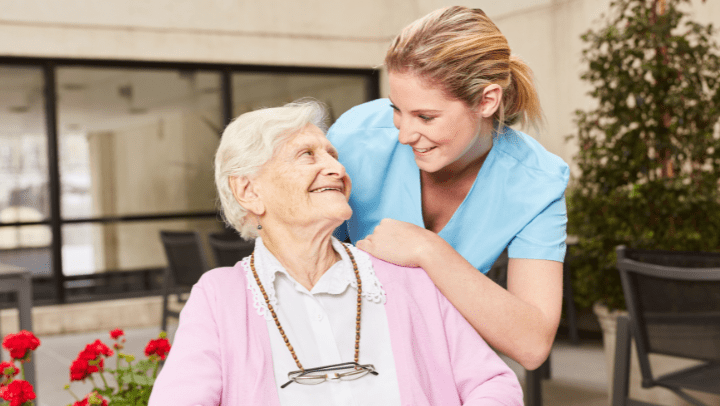
Introduction to Anxiety in Seniors
Aging loved ones may experience emotional and psychological difficulties, such as anxiety. Anxiety is a prevalent issue among seniors, often exacerbated by various life transitions, health concerns, and environmental factors. As a caregiver, it’s crucial to recognize and understand the complexities of anxiety to provide practical support and care.
Anxiety disorders can look different for different people. Some common types include generalized anxiety disorder, social anxiety, phobias, and panic disorder. These conditions can severely impact a senior’s well-being, leading to physical, emotional, and social distress. Understanding anxiety in seniors helps caregivers support their loved ones more effectively.
Common Causes and Triggers of Anxiety in Seniors
- Health concerns: Chronic illnesses, pain, or the fear of declining health can heighten anxiety levels.
- Cognitive changes: Memory loss, confusion, and poor decision-making can cause anxiety and uncertainty.
- Loss and grief: Losing loved ones, independence, or familiar surroundings can lead to anxiety and depression.
- Social isolation: Loneliness and a lack of social connections can amplify feelings of anxiety and insecurity.
- Medication side effects: Certain medications or interactions between multiple prescriptions can contribute to anxiety symptoms.
- Environmental changes: Relocating to a new living situation or unfamiliar surroundings can cause anxiety and disorientation.
Signs and Symptoms of Anxiety in Seniors
Recognizing anxiety signs and symptoms helps caregivers provide timely support. While anxiety can manifest differently in each individual, some common indicators include:
- Restlessness or irritability
- Muscle tension or trembling
- Difficulty concentrating or mind going blank
- Sleep disturbances or insomnia
- Fatigue or low energy levels
- Gastrointestinal issues, such as nausea or diarrhea
- Excessive worry or rumination
- Avoidance of social situations or activities
Understanding the Role of Caregivers in Addressing Anxiety in Seniors
As a caregiver, you play a crucial role in recognizing, managing, and supporting seniors who experience anxiety. Your responsibilities may include:
- Observation and monitoring: Closely observing your loved one’s behaviors, moods, and patterns can help identify potential triggers or signs of anxiety.
- Communication and emotional support: Offering a supportive and understanding environment can help your loved one cope with their anxiety.
- Advocating for professional help: Consulting with healthcare professionals, such as doctors, therapists, or counselors, to develop an appropriate treatment plan.
- Implementing coping strategies: Assisting your loved one in practicing relaxation techniques, engaging in enjoyable activities, or modifying their environment to reduce anxiety triggers.
- Promoting a healthy lifestyle: Regular exercise, a balanced diet, and enough sleep can help manage anxiety.
Effective Communication Strategies for Caregivers
Effective communication is essential when supporting a senior with anxiety. Here are some tips to improve your communication and build trust:
- Active listening: Practice active listening by giving your full attention, maintaining eye contact, and allowing your loved one to express themselves without interruption.
- Validating feelings: Acknowledge and validate your loved one’s emotions, even if you cannot relate to their experiences. Avoid dismissing or minimizing their concerns.
- Using clear and simple language: Speak slowly, use straightforward language, and avoid complex medical terminology or jargon that may cause confusion or anxiety.
- Offering reassurance: Remind your loved one that you support them through their challenges.
The Benefits of Assisted Living in Elm Grove, WI, for Senior Care
For seniors experiencing anxiety or other age-related challenges, assisted living in Elm Grove, WI, for senior care, can provide a supportive and nurturing environment. Benefits of these communities include:
- Personalized care and assistance: Our trained staff can help with daily tasks, medications, and personalized care.
- Social opportunities: Residents can participate in various social activities, which foster connections and reduce feelings of isolation and loneliness.
- Specialized programming and amenities: Many communities offer specialized programs, such as memory care, tailored to the unique needs of residents with cognitive or emotional challenges.
- Peace of mind for caregivers: With professional care and support available, caregivers can experience reduced stress and peace of mind knowing their loved ones are in a nurturing environment.
If you or a loved one are considering Assisted Living in Elm Grove, WI, we invite you to explore our community at Heritage Elm Grove. We create a nurturing environment where your loved one can feel supported as they work through anxiety. Contact us at (262) 786-5800 to learn more.
Supporting Seniors with Anxiety
Anxiety in seniors is a complex and multifaceted issue that requires compassion, understanding, and a multidisciplinary approach. As a caregiver, your role is invaluable in recognizing the signs of anxiety, implementing coping strategies, and creating a supportive environment for your loved one.
Remember, you are not alone in this journey. Seek support from healthcare professionals, counselors, and support groups to ensure you have the resources and knowledge to provide the best possible care. Additionally, consider exploring Assisted Living in Elm Grove, WI, where your loved one can receive comprehensive care and support from trained professionals.


